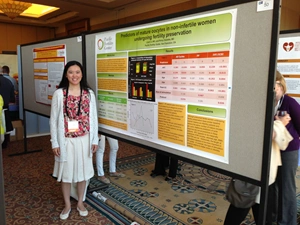
PCRS Update: Dr. Li's Poster
Each year, PFC physicians and staff also present research posters at PCRS. The next few blog entries will provide you with an overview of the posters PFC presented.
During the past year, we have seen a surge of public interest from women in the Bay Area who want to freeze their eggs while they pursue their careers or search for their life partners. We have frozen eggs for almost 100 women for this purpose. A summary of their demographic information was presented by Kirstin Dougall in a separate PFC poster presentation.
My interest in this group of women was more clinically focused. I wanted to determine whether this group, electing to undergo treatment, would respond the same or differently to ovarian stimulating hormones as our traditional patients who have been struggling with infertility. To answer this question, we collected information regarding fertility potential, such as age, antral follicle count (AKA egg count), and FSH and AMH, two hormones that have been routinely used to predict an infertility patients ovarian function. I compared the fertility potential markers, the types of treatment protocol, and the number of eggs per treatment cycle between women who froze their eggs and those with infertility. It turned out that on average the two groups of women responded equally to ovarian stimulation and get equal number of mature eggs per cycle. However, there was one significant difference between them. While all of the fertility potential markers were important in predicting how many mature eggs an infertility patient would achieve per treatment cycle, they were less predictive in women who froze their eggs, with only the antral follicle count being a statistically significant predictor.
The findings were reassuring and puzzling at the same time. We were reassured by the fact that non-infertile women responded equally well to ovarian stimulation. Therefore we would not need to adjust our treatment protocols significantly. It was unsetting, however, that the tools we have become comfortable using in predicting outcomes in infertility patients turned out not to be as useful in women who froze their eggs. Further research is needed to find more accurate predictors of fertility in these women so that they can be properly counseled regarding their chance of success.
- Liyun Li, M.D.
Categories
About the Blog
Welcome to the Pacific Fertility Center Blog! Nationally and internationally recognized for providing exceptional reproductive care, our team believes in empowering people with the knowledge they need to navigate their unique fertility journeys.
From information on the latest fertility treatments to valuable insights on egg donation, surrogacy, and everything in between, the Pacific Fertility Center Blog is your ultimate resource for all things reproductive care and support. Read on to learn more, and contact us today if you have any questions or want to schedule a new patient appointment.

